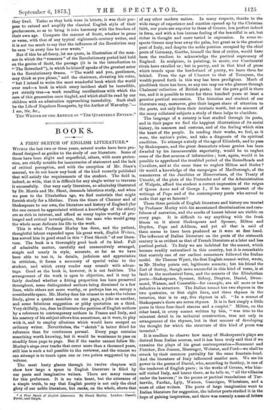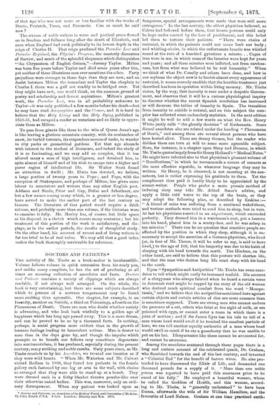BOOKS.
A FIRST SKETCH OF ENGLISH LITERATURE.*
WITHIN the last two or three years, several works have been pro- duced designed as guides to the study of our literature. Some of
these have been slight and superficial, others, with more preten- sion, are chiefly notable for inaccuracies of statement and the lack of critical perception, and with the exception of Mr. Shaw's manual, we do not know any book of the kind recently published that will satisfy the requirements of the student. The field is, indeed, so wide, that it is difficult for any single writer to traverse it successfully. Our very early literature, so admirably illustrated by Dr. Morris and Mr. Skeat, demands laborious study, and when we pass to the Elizabethan age, we find materials that might furnish study for a lifetime. From the times of Chaucer and of Shakespeare to our own, the literature and history of England (for the one cannot be appreciated without acknowledge of the other) are so rich in interest, and afford so many topics worthy of pro- longed and critical investigation, that the man who would grasp the whole must dedicate his life to the work.
This is what Professor Morley has done, and the patient, thoughtful labour expended upon his great work, English Writers, has served him in good stead in this " First Sketch" of our litera- ture. The book is a thoroughly good book of its kind. Full of admirable matter, carefully and consecutively arranged, simple and manly in style, accurate, so far as we have been able to test it, in details, judicious and appreciative in criticism, it forms a summary of special value to the student, and which every reader may consult with advan- tage. Good as the book is, however, it is not faultless. The arrangement of the work is open to objection, and it may be fairly doubted whether a fitting proportion has been preserved throughout, some distinguished authors being dismissed in a few lines, while others not more worthy, or perhaps leas so, occupy a considerable space. Mr. Morley does his utmost to make the volume lively, gives a quaint anecdote on one page, a joke on another, and some felicitous suggestion or pithy quotation on a third. Very skilfully, too, does he illustrate the position of English authors by a reference to contemporary authors in France and Italy, and his mastery of his subject allows him sometimes, as it were, to play with it, and to employ allusions which would have escaped an ordinary writer. Nevertheless, the "sketch" is better fitted for reference than for continuous perusal. Every page contains something worth knowing, but it would be wearisome to pass on steadily from page to page. But if the reader cannot follow Mr. Morley's steps over tracks that cover more than a thousand years, still less is such a toil possible to the reviewer, and the utmost we can attempt is to touch upon one or two points suggested by the volume.
The most hasty glance through its twelve chapters will show how large a space in English literature is filled by our poets and imaginative writers. There are many reasons for this preference. It is no vain boast, but the utterance of a simple truth, to say that English poetry is not only the chief glory of our noble literature, but ranks, on the whole, above that
• A First &etch of English Literature. By Henry Morley. London : Cassell, Fetter, and Gilpin.
of any other modern nation. In many respects, thanks to the wide range of experience and emotion opened up by the Christian faith, our poets are superior to those of Greece, less perfect indeed in form, and with a less intense feeling of the beautiful in art, but richer in thought and more varied in expression. In some re- spects Greece may bear away the palm, but great as is the greatest poet of Italy, and despite the noble position occupied by the chief poets of Germany, Goethe, himself the first of critics, would have been the readiest to acknowledge the poetical supremacy of England. In sculpture, in painting, in music, our Continental rivals have excelled us ; but in poetry, and in that kind of prose which trends upon the borderland of poetry, we leave them tar behind. From the age of Chaucer to that of Tennyson, the wealth poured forth in this way has been prodigious. Much of pinchbeck there has been, as any one may see who glances through Chalmers' collection of British poets ; but the pure gold is there too, and it is possible to trace for three hundred years at least a genuine poetical succession. The historian and student of our literature may, moreover, give their largest share of attention to the poets, not only from their intrinsic worth, but on account of the many collateral subjects a study of them helps to elucidate.
The language of a country is best studied through its poets, and in their pages we find the happiest illustrations of its social history, its manners and customs, and of the feeling which stirs the heart of the people. In reading their works, we feel, as it were, the nation's pulse, and take a diagnosis of its spiritual condition. To attempt a study of the age of Elizabeth, and to pass by Shakespeare, and the great dramatists whose genius has been dwarfed by his immeasurable superiority, would be to neglect some of the first sources of information ; bow, again, would it be possible to apprehend the troubled period of the Roundheads and Cavaliers, and at the same time to neglect Milton and Butler? Or would a knowledge of the campaigns of Marlborough, of the manoeuvres of the Jacobites or Hanoverians, of the Treaty of Utrecht, of the plots of the Pretender and of the Administration of Walpole, afford the student a correct impression of the reigns of Queen Anne and of George I., if he were ignorant of the writings of Pope and of the contemporary poets who served to make that age so famous ?
These three periods of English literature and history are treated by Professor Morley with his accustomed discrimination and care- fulness of narration, and the marks of honest labour are visible on every page. It is difficult to say anything with the fresh bloom on it about Shakespeare and Spenser, Milton and Dryden, Pope and Addison, and yet all that is said of them seems to have been produced as it were at first hand. The influence of Italian literature on the poets of the sixteenth century is as evident as that of French literature at a later and less poetical period. To Italy we are indebted for the sonnet, which became readily naturalised in this country, but it is remarkable that scarcely one of our earliest sonneteers followed the Italian model. Sir Thomas Wyatt, the first English sonnet-writer, wrote, as Mr. Morley points out, legitimate sonnets ; but his friend the Earl of Surrey, though more successful in this kind of verse, is at fault in the mechanical form, and the sonnets of the Elizabethan poets—Shakespeare, Spenser, Sidney, Drayton, Daniel, Drum- mond, Watson, and Constable—for example, are all more or less defective in structure. The Italian sonnet has two rhymes in the two quatrains, or first eight lines, and three rhymes in the terzettes, that is to say, five rhymes in all. "In a sonnet of Shakespeare's there are seven rhymes. It is in fact simply a little poem in three four-lined stanzas and a couplet." Milton, on the other hand, in every sonnet written by him, " was true to the minutest detail in its technical construction, true not only in arrangement of the rhymes, but in that manner of developing the thought for which the structure of this kind of poem was invented."
It is needless to observe how many of Shakespeare's plays are derived from Italian sources, and it has been truly said that if we examine the plays of his great contemporaries—Beaumont and Fletcher, Ben Jonson, Massinger, Webster, and Ford—we shall be struck by their common partiality for the same fountain-head.
And the literature of Italy influenced smaller men. We see its power in the poems of Daniel, who, according to Southey, is one of the tenderest of English poets ; in the works of Greene, who him- self visited Italy, and learnt there, as he tells us, " all the villanies under the heavens ;" in the poems or poetical translations of Tur- bervile, Fairfax, Lyly, Watson, Gascoigne, Whetstone, and a
score of other writers. The poets of large imagination went to Italian literature for suggestion, the inferior poets studied it in the hope of gaining inspiration, and there was scarcely a man of letters
of that age who was not more or less familiar with the works of Dante, Petrarch, Tasso, and Boccaccio. Can as much be said now ?
The stream of noble writers in verse and poetical prose flowed on in freedom and fullness long after the death of Elizabeth, and even when England had sunk politically to its lowest depth in the reign of Charles II. That reign produced the Paradise Lost and Paradise Regained, the Pilgrim's Progress, the masterly discourses of Barrow, and much of the splendid eloquence which distinguishes "the Chrysostom of English divines,"—Jeremy Taylor. Milton was born five years before Taylor and died seven years after him, yet neither of these illustrious men ever mentions the other. Party prejudices were stronger in those days than they are now, and no doubt between Milton the iconoclast and Taylor the chaplain to Charles I. there was a gulf not readily to be bridged over. Yet they might have met, one would think, on the common ground of poetry and scholarship and devout aspirations. Milton's greatest work, the Paradise Lost, was in all probability unknown to Taylor—it was only published a few months before his death—but he may have read Areopagitica and the Comes, and it is hard to believe that the Holy Living and the Holy Dying, published in 1650-51, had escaped a reader so voracious and so likely to appre-
ciate them as Milton. .
To pass from giants like these to the wits of Queen Anne's age is like leaving a glorious mountain country, with its avalanches of snow, its turbid torrents, its stupendous masses of rocks, to wander in city parks or geometrical gardens. Yet that age abounds with interest to the student of literature, and indeed the study of it is so fascinating, and we may add so complex, that it has allured many a man of high intelligence, and detained him, in spite almost of himself and of his wish to escape into a higher and purer region of intellectual life. Sir Walter Scott found an attraction in Swift ; Mr. Elwin has devoted, we believe, a large portion of twenty years to Pope ; and Pope, with the exception of Shakespeare, and perhaps of Milton, has given more labour to annotators and writers than any other English poet. Addison and Steele, Prior and Gay, Defoe and Arbuthnot, are but a few names among many which, in a greater or less degree, have served to make the earlier part of the last century so famous. The literature of that period would require a thick volume, and probably more than one volume, if the historian were to examine it fully. Mr. Morley has, of course, but little space at his disposal, in a sketch which covers many centuries ; but his treatment of this portion of the work is satisfactory, and dis- plays, as in the earlier periods, the results of thoughtful study. On the other hand, his account of recent and of living writers is far too brief to be of real value. We may add that a good index makes the book thoroughly serviceable for reference.































 Previous page
Previous page